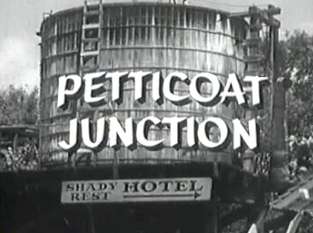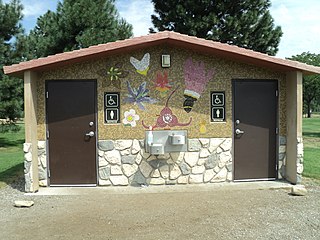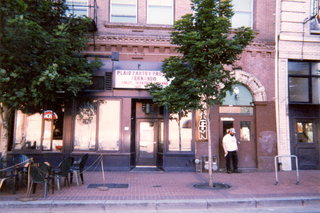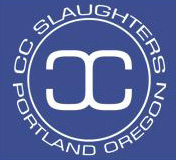
The Cotton Club was a 20th-century nightclub in New York City. It was located on 142nd Street and Lenox Avenue from 1923 to 1936, then briefly in the midtown Theater District until 1940. The club operated during the United States' era of Prohibition and Jim Crow era racial segregation. Black people initially could not patronize the Cotton Club, but the venue featured many of the most popular black entertainers of the era, including musicians Fletcher Henderson, Duke Ellington, Jimmie Lunceford, Chick Webb, Louis Armstrong, Count Basie, Fats Waller, Willie Bryant; vocalists Adelaide Hall, Ethel Waters, Cab Calloway, Bessie Smith, Lillie Delk Christian, Aida Ward, Avon Long, the Dandridge Sisters, the Will Vodery choir, The Mills Brothers, Nina Mae McKinney, Billie Holiday, Midge Williams, Lena Horne, and dancers such as Katherine Dunham, Bill Robinson, The Nicholas Brothers, Charles 'Honi' Coles, Leonard Reed, Stepin Fetchit, the Berry Brothers, The Four Step Brothers, Jeni Le Gon and Earl Snakehips Tucker.

The Madonna Inn is a motel in San Luis Obispo, California. Opened for business in 1958, it quickly became a landmark on the Central Coast of California. It is noted for its unique decor, pink dining room, and themed rooms. It was created by Alex Madonna, a successful construction magnate and entrepreneur, and his wife Phyllis. The inn includes a restaurant and bakery, and is located on the west side of US Route 101 and situated on the lower eastern portion of Cerro San Luis Obispo.

Petticoat Junction is an American television sitcom that originally aired on CBS from September 1963 to April 1970. The series takes place at the Shady Rest Hotel, which is run by Kate Bradley; her three daughters Billie Jo, Bobbie Jo, and Betty Jo; and her uncle Joe Carson. The series is one of three interrelated shows about rural characters produced by Paul Henning. Petticoat Junction was created upon the success of Henning's previous rural/urban-themed sitcom The Beverly Hillbillies (1962–1971). The success of Petticoat Junction led to a spin-off, Green Acres (1965–1971). Petticoat Junction was produced by Filmways, Inc.

Portland Union Station is a train station in Portland, Oregon, United States, situated near the western shore of the Willamette River in Old Town Chinatown. It serves as an intermediate stop for Amtrak's Cascades and Coast Starlight routes and, along with King Street Station in Seattle, is one of two western termini of the Empire Builder. The station is a major transport hub for the Portland metropolitan area with connections to MAX Light Rail, the Portland Streetcar, and local and intercity bus services. The station building contains Wilf's Restaurant & Bar on the ground level and offices on the upper floors. It also has Amtrak's first Metropolitan Lounge on the West Coast, which is reserved for first-class sleeping car and business-class passengers.

A public toilet, restroom, public bathroom or washroom is a room or small building with toilets and sinks for use by the general public. The facilities are available to customers, travelers, employees of a business, school pupils or prisoners and are commonly separated into male and female toilets, although some are unisex, especially for small or single-occupancy public toilets, public toilets are sometimes accessible to people with disabilities. Depending on the culture, there may be varying degrees of separation between males and females and different levels of privacy. Typically, the entire room, or a stall or cubicle containing a toilet, is lockable. Urinals, if present in a male toilet, are typically mounted on a wall with or without a divider between them. Local authorities or commercial businesses may provide public toilet facilities. Some are unattended while others are staffed by an attendant. In many cultures, it is customary to tip the attendant, especially if they provide a specific service, such as might be the case at upscale nightclubs or restaurants.
The Hooterville Cannonball is a fictional railroad train featured in Petticoat Junction, an American situation comedy that originally aired on CBS from 1963 to 1970. The train was considered an "important character" by the show's producers, and producer Paul Henning hired railroad historian Gerald M. Best to make sure that the locomotive sounds used on the show were authentic to a train of the same type and age.
The Cotton Club was a nightclub located in North Portland, Oregon, United States. Located at 2125 N. Vancouver Avenue, the club gained attention during the 1960s as the "only nightclub on the West Coast with wall-to-wall soul." Celebrities such as Cab Calloway, Sammy Davis Jr., Cass Elliot, The Kingston Trio, Joe Louis, and Archie Moore would visit the nightclub when they were in town.

William Edgar Buchanan II was an American actor with a long career in both film and television. He is most familiar today as Uncle Joe Carson from the Petticoat Junction, Green Acres, and The Beverly Hillbillies television sitcoms of the 1960s.

Satyricon was a nightclub in the Old Town neighborhood of Portland, Oregon, United States that operated from 1984 to 2010. It was the longest-running punk venue in the western United States, and has been referred to by some journalists and historians as the "CBGB of the West Coast." It is also the place where musicians Kurt Cobain and Courtney Love are said to have first met.

The Cromwell Las Vegas is a luxury boutique casino hotel on the Las Vegas Strip in Paradise, Nevada. It is owned and operated by Caesars Entertainment. It was originally opened by Michael Gaughan as the Barbary Coast on March 2, 1979. Several nearby resorts were opposed to its construction, partially due to concerns about increased traffic congestion. The property featured Victorian décor and later became part of Gaughan's company, Coast Casinos. The Barbary Coast would go on to add two popular restaurants, and a nightclub by Victor Drai.

The Bank of California Building, also known as the Durham & Bates Building and currently the Three Kings Building, is a historic former bank building in downtown Portland, Oregon, United States. It has been on the National Register of Historic Places since 1978. The three-story building was designed by A. E. Doyle in an Italianate style and completed in 1925. The ground floor features a two-story-high grand room with 36-foot (11 m) ceilings. The building's original owner and occupant, the Bank of California, moved out around the end of 1969 and sold the building in 1970. It was last used as a bank in 1977. It is currently owned by Surlamer Investments.

The Dunbar Hotel, originally known as the Hotel Somerville, was the focal point of the Central Avenue African-American community in Los Angeles, California, during the 1930s and 1940s. Built in 1928 by John Alexander Somerville, it was known for its first year as the Hotel Somerville. Upon its opening, it hosted the first national convention of the National Association for the Advancement of Colored People (NAACP) to be held in the western United States. In 1930, the hotel was renamed the Dunbar, and it became the most prestigious hotel in LA's African-American community. In the early 1930s, a nightclub opened at the Dunbar, and it became the center of the Central Avenue jazz scene in the 1930s and 1940s. The Dunbar hosted Duke Ellington, Cab Calloway, Billie Holiday, Louis Armstrong, Lionel Hampton, Count Basie, Lena Horne, and many other jazz legends. Other noteworthy people who stayed at the Dunbar include W. E. B. Du Bois, Joe Louis, Ray Charles, and Thurgood Marshall. Former heavyweight champion Jack Johnson also ran a nightclub at the Dunbar in the 1930s.

The Multnomah Hotel, located in downtown Portland, Oregon, United States, is a historic hotel building listed on the National Register of Historic Places. It currently operates as the Embassy Suites by Hilton Portland Downtown.

CC Slaughters is a gay bar and nightclub located in Portland, Oregon, and Puerto Vallarta, Mexico. The Portland bar is located in the Old Town Chinatown neighborhood, and the Puerto Vallarta bar is located in Zona Romántica.

The Roseland Theater, sometimes called the Roseland Theater and Grill, is a music venue located at 8 Northwest Sixth Avenue in the Old Town Chinatown neighborhood of Portland, Oregon, in the United States. The building was originally a church, constructed by the Apostolic Faith Church in 1922. In 1982, Larry Hurwitz converted the building to a music venue called Starry Night. In 1990, the club's 21-year-old publicity agent was murdered in one of the theater's hallways; Hurwitz was convicted for this murder ten years later. Hurwitz sold the club in 1991, claiming he had lost support from the local music industry. The venue was given its current name during the 1991 ownership transfer. During the 1990s, Double Tee acquired control of the hall's operations, then purchased and renovated the building.

The Gypsy Restaurant and Velvet Lounge was a restaurant and nightclub established in 1947 and located along Northwest 21st Avenue in the Northwest District neighborhood of Portland, Oregon, in the United States. Popular with young adults, the restaurant was known for serving fishbowl alcoholic beverages, for its 1950s furnishings, and for hosting karaoke, trivia competitions, and goldfish racing tournaments. The restaurant is said to have influenced local alcohol policies; noise complaints and signs of drunken behavior by patrons made the business a target for curfews and closure. Concept Entertainment owned the restaurant from 1992 until 2014 when it was closed unexpectedly.

LGBTQ culture in Portland, Oregon is an important part of Pacific Northwest culture.
The Castle Jazz Band was a Dixieland jazz band, part of the "West Coast revival" of traditional jazz music. Their recordings were popular worldwide for a time, although touring outside their Portland, Oregon base was limited.















